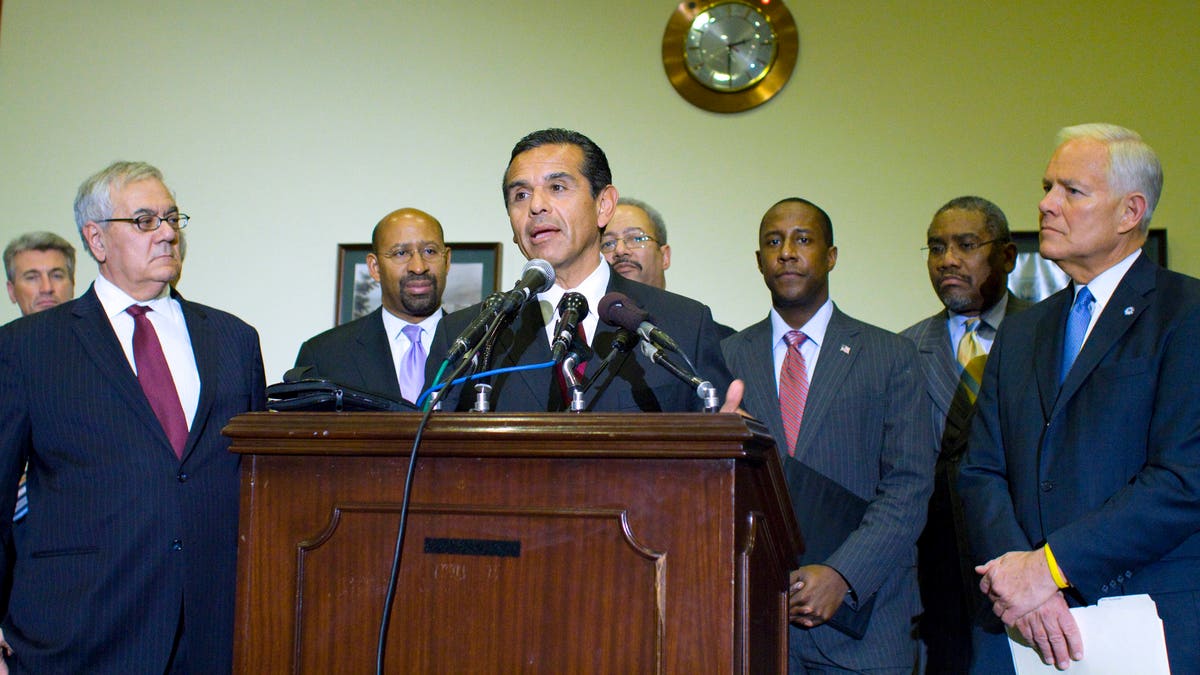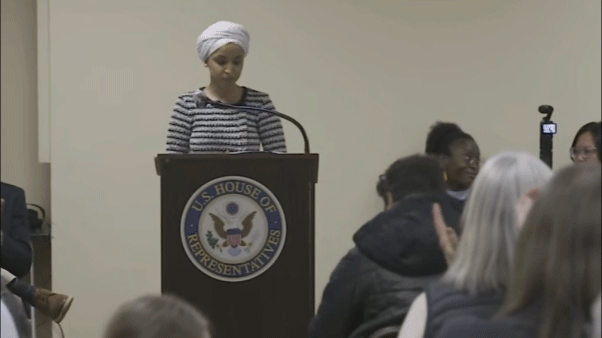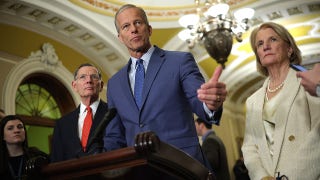
From left, Rep. Barney Frank, D-Mass., Philadelphia Mayor Michael Nutter, Los Angeles Mayor Antonio Villaragosa, Rep. Chaka Fattah, D-Pa., Newton, Mass. Mayor Setti Warren, Rep. Gregory Meeks, D-N.Y, and Akron, Ohio Mayor Donald Plusquellic, take part in a news conference on Capitol Hill in Washington, Wednesday, Jan. 19, 2011, to discuss the impact of cutting Community Development Block Grants. (AP)
Grappling with a brutal economic climate, more than 200 of the nation's mayors have descended upon Washington to urge President Obama to help cities out of the fiscal morass they find themselves in as state and federal aid dries up.
Several mayors, attending the annual National Conference of Mayors, met behind closed doors with the president and Vice President Biden on Thursday afternoon. Job creation is high on the agenda as the local executives push the administration to help find work in America's cities and townships, where 85 percent of the nation's population resides.
Los Angeles Mayor Antonio Villaraigosa said the group had a "great meeting" in which the president said he would focus on economic development and "the need for the federal government to partner with cities."
"What was clear to me, this is a president who is focused on our cities," Villaraigosa said after the meeting.
More than one-third of the nation's 363 metro areas are expected to have unemployment rates higher than 10 percent at the end of 2011, according to a report released by the conference and Global Insight.
"This data is solid proof that Congress needs to be laser-beam focused on jobs creation," Burnsville, Minn., Mayor Elizabeth Kautz in said a press release. "We are in the middle of a 'jobs emergency' that demands decisive and swift action."
Also among the concerns that are expected to be raised is a fear that Obama will propose cutting as much as 25 percent or $1 billion out of the Community Development Block Grants (CDBG), the federal program that provides cash to municipalities for economic development, low-income housing and other needs.
"As we speak, cities and towns across this country are considering layoffs to direct service personnel -- police, fire, teachers, DPW (Department of Public Works). In my area, they're struggling to meet current requirements for snow removal," said Rep. Michael Capuano, D-Mass., appearing at a news conference Wednesday held by several mayors and Democratic lawmakers.
Mayors "cannot print money, they cannot borrow money for operating expenses, and they have to meet their bottom line each and every year. If we cut CDBG, everybody's quality of life will be reduced," said Capuano.
CDBG, which was established in 1974, received $4.4 billion last fiscal year. Cities that get the grant money have great flexibility in how they spend it.
More than 1,200 cities and towns receive the money either directly from the federal government or from the states. Seventy percent of the money flows directly to cities with populations of at least 50,000 and counties with at least 200,000 people. The rest goes to states which distribute the money to municipalities and rural areas with smaller populations.
In the last fiscal year, New York City received the most money from CDBGs at $195.2 million, a fraction of its $60 billion budget. Chicago, which has a budget of about $6 billion, was second, receiving $90.5 million. Los Angeles, which has a budget of nearly $7 billion, came in third with $77.9 million. Marco Island, Fla., which has a budget of about $20 million, received the least amount of money with $77,000.
That's on top of assistance to cities receive from states like New Jersey, which last year doled out more than $120 million to six distressed cities despite a $10.5 billion state deficit. Pennsylvania, which also provides a program to stabilize municipalities under severe financial strain, reportedly has at least 20 cities receiving state aid for budget shortfalls. The state is projected to have a $4 billion to $5 billion budget deficit this year.
Eleven states are facing new mid-year deficits for fiscal year 2011 and 40 have already projected shortfalls for fiscal 2012 that add up to about $113 billion, according to the Center for Budget and Policy Priorities
Despite $144 billion set aside to states and municipalities in the federal stimulus act passed in 2009, cities say CDBG funding must remain at current levels.
"At a time when our economy is only slowly beginning to recover and states and local governments are still making drastic cuts in their budgets, CDBG is an investment that will stimulate much needed job growth and leverage crucial private and public investments," said Setti Warren, mayor of Newton, Mass., and the new chairman of the U.S. Conference of Mayors' Committee on Community Development and Housing.
The president has been tacking to the middle in recent weeks as he tries to deal with a new political landscape in which Republicans, who have more power on Capitol Hill, are vowing to slash federal spending by as much as $100 billion each year.
The White House Office of Management and Budget wouldn't confirm whether cuts to the CDBG program are under discussion as the president prepares his annual budget blueprint, due next month. But OMB spokesman Ken Baer didn't rule it out.
"There are lots of rumors of what's in and what's out of the budget. We will comment on it when the document is released," Baer said in an e-mail to FoxNews.com. "As the president has said, there will be some tough choices that will have to be made in order to put us on sound fiscal footing which is critical to long-term economic growth and making the U.S. competitive in the world economy."
A Republican House Budget Committee aide did not say whether CDBG would get the ax, but said no aspect of the federal budget "should be immune from thorough oversight."
"It's critical that all levels of government work together to help get their fiscal houses in order," the GOP aide told FoxNews.com.











































